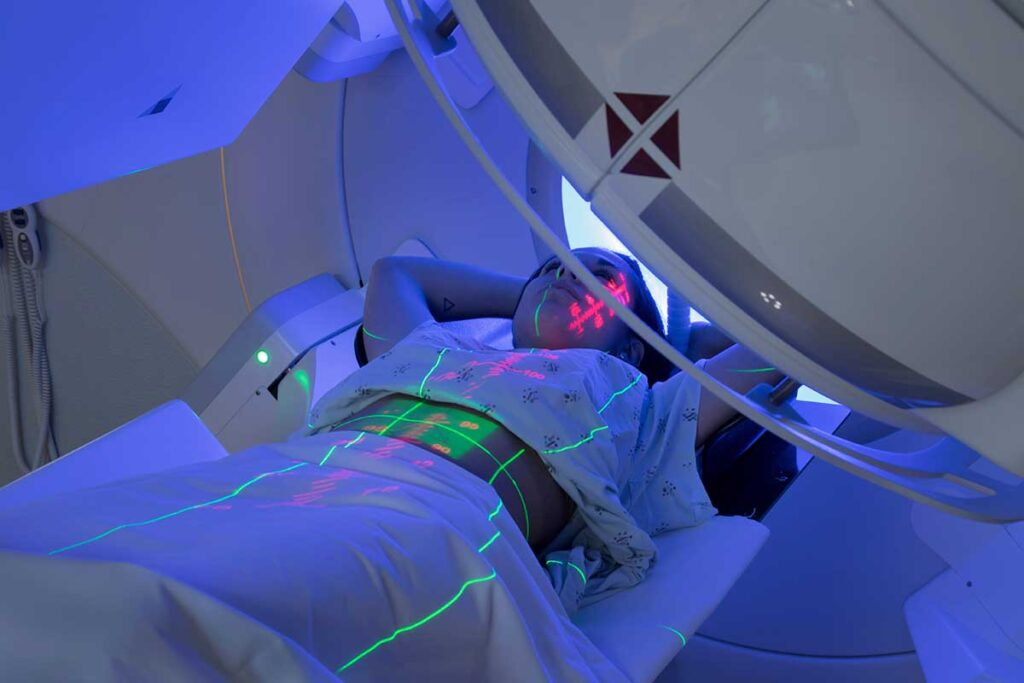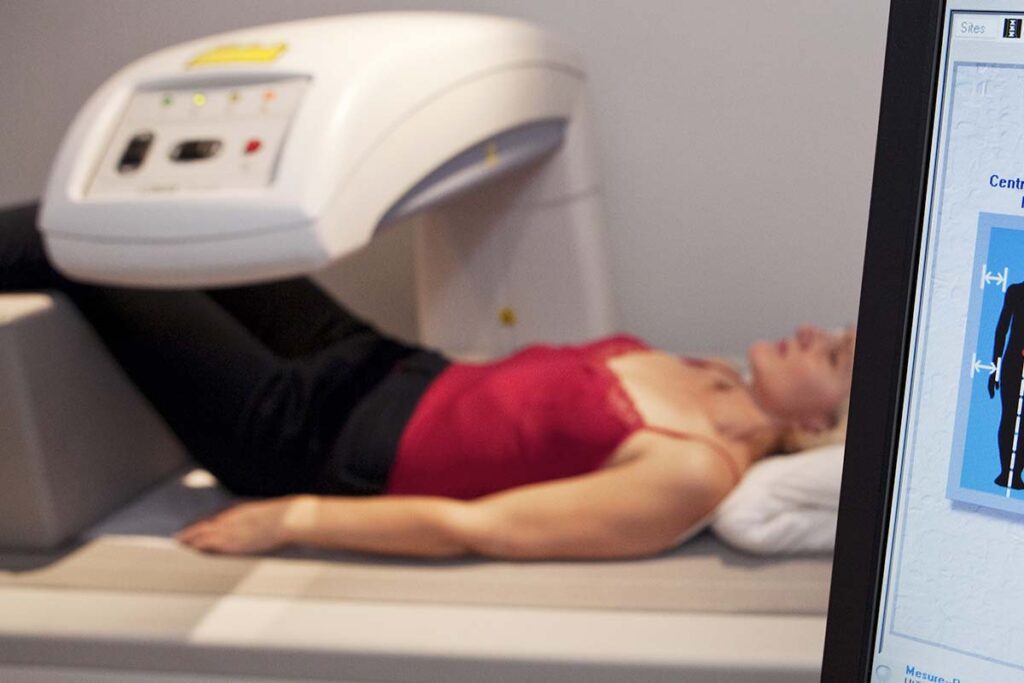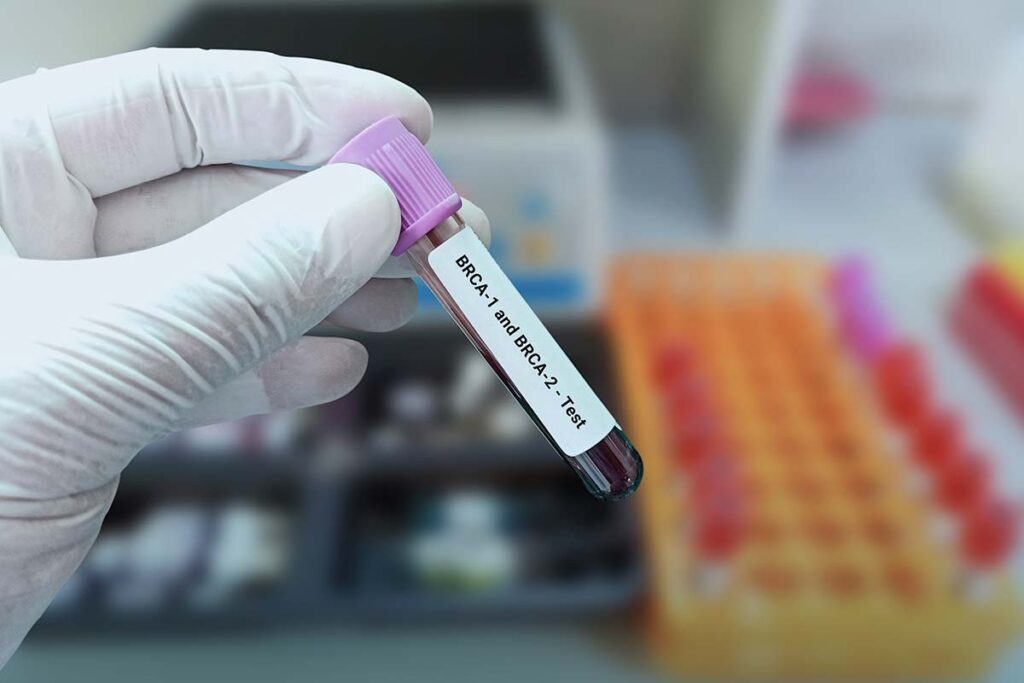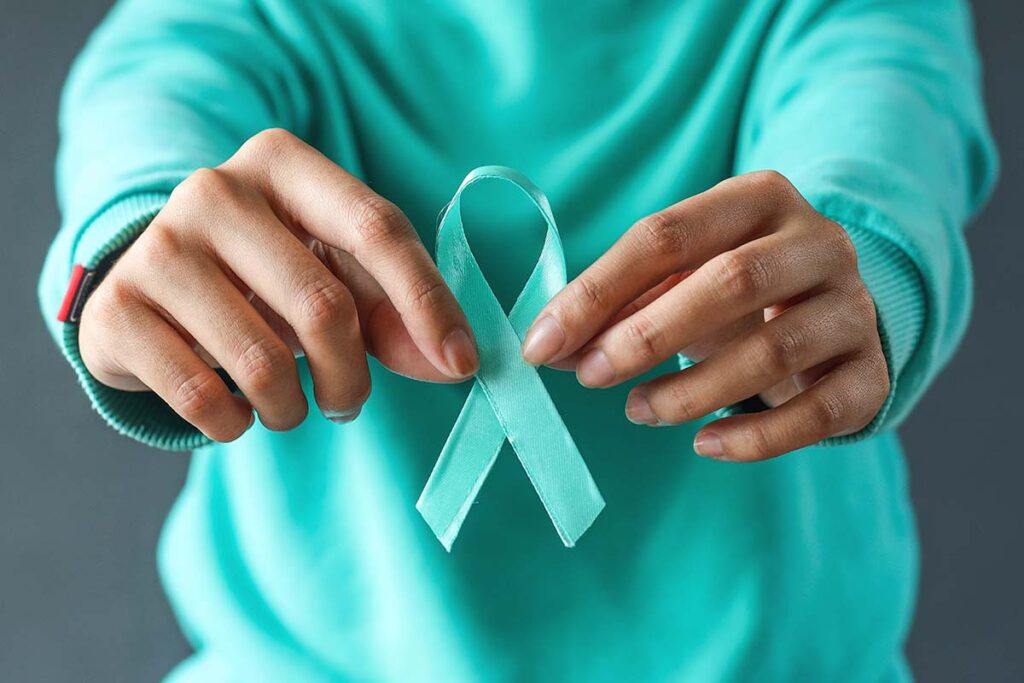Ovarian cancer is a formidable adversary, affecting women of all ages worldwide. Its silent nature often renders it undetectable until advanced stages, making it one of the most challenging cancers to diagnose and treat effectively.
However, amidst the shadows of this disease, you’ll find a beacon of hope — knowledge. Understanding ovarian cancer, its signs, symptoms, risk factors, treatment options, and support resources is paramount in the fight against it.
In this comprehensive guide, we’ll illuminate the intricacies of ovarian cancer. From its biology to its impact on daily life, our goal is to give those affected a better understanding of the disease, offering insights, guidance, and solace that can make the journey easier. Whether you’re a patient, caregiver, healthcare professional, or advocate, you’ll gain the knowledge needed to navigate the challenges of ovarian cancer with resilience, grace, and determination.
Ovarian cancer is a type of cancer that affects the ovaries, the reproductive organs in women responsible for producing eggs. This disease occurs when normal cells in the ovaries grow out of control, forming tumors. These tumors can be benign (non-cancerous) or malignant (cancerous). Ovarian cancer is often referred to as the “silent killer” because its symptoms can be subtle and easily mistaken for other less severe conditions. It’s essential for you to understand the risk factors, symptoms, and available treatment options to detect and manage ovarian cancer effectively.
Understanding Ovarian Cancer: An Overview
Ovarian cancer is a type of cancer that affects the ovaries, the reproductive organs in women responsible for producing eggs. This disease occurs when normal cells in the ovaries grow out of control, forming tumors. These tumors can be benign (non-cancerous) or malignant (cancerous). Ovarian cancer is often referred to as the “silent killer” because its symptoms can be subtle and easily mistaken for other less severe conditions. It’s essential for you to understand the risk factors, symptoms, and available treatment options to detect and manage ovarian cancer effectively.

Signs and Symptoms of Ovarian Cancer
Recognizing the signs and symptoms of ovarian cancer is crucial for early detection and successful treatment. Symptoms may include abdominal bloating, pelvic pain, difficulty eating or feeling full quickly, changes in bowel habits, and frequent urination. However, these symptoms can be vague and may mimic other less severe conditions, which can make ovarian cancer challenging to diagnose. That’s why paying attention to your body and seeking medical attention if you experience persistent or worsening symptoms is essential.

Types of Ovarian Cancer and Their Characteristics
Ovarian cancer can be classified into several types based on the specific cells where the cancer originates. The most common type is epithelial ovarian cancer, which develops in the cells covering the ovaries’ outer surface. Other less common types include germ cell tumors and stromal tumors, which develop in the egg-producing cells and the cells that support hormone production, respectively. Each type of ovarian cancer has its own characteristics and may require different treatment approaches.

Ovarian Cancer Risk Factors: What You Need to Know
Several factors can increase a woman’s risk of developing ovarian cancer, including age, family history, genetic mutations (such as BRCA1 and BRCA2), personal history of breast or colorectal cancer, and certain reproductive factors (such as never having been pregnant or starting menstruation at an early age). Additionally, the use of talcum powder in the genital area has been linked to an increased risk of ovarian cancer in some studies. Understanding these risk factors can help you take proactive steps to reduce your risk or detect ovarian cancer early through regular screenings.

Ovarian Cancer and Talcum Powder: Should You Take Legal Action?
Facing ovarian cancer is an incredibly challenging journey. If you believe talcum powder may have played a role in your diagnosis, it’s natural to have questions and concerns about legal action. Talcum powder, commonly found in products like baby powder and cosmetics, has been associated with ovarian cancer in many studies. Women who were affected began coming forward with their stories and demanding accountability from the manufacturers. Should you do the same?
As you navigate this decision, it’s essential to prioritize your well-being and seek guidance from trusted sources. Dealing with cancer is complicated enough on its own; adding the stress of a legal battle may be overwhelming.
Whatever path you choose, lean into your support system. Reach out to loved ones, healthcare providers, and support networks for guidance, understanding, and compassion as you navigate this difficult decision. Your voice and your story matter, and you deserve support and justice every step of the way.
Early Detection of Ovarian Cancer: Why and How
Early detection of ovarian cancer significantly improves the chances of successful treatment and long-term survival. However, because ovarian cancer often presents with vague symptoms and there is no routine screening test for the general population, it can be challenging to diagnose in its early stages. Women with a family history of ovarian or breast cancer or those with specific genetic mutations may benefit from genetic testing and regular screenings, such as transvaginal ultrasound and CA-125 blood tests. You must discuss your risk factors and screening options with your healthcare providers.

Ovarian Cancer Stages Explained
Ovarian cancer is staged based on the extent of the disease and how far it has spread beyond the ovaries. The stages range from stage I (cancer is confined to the ovaries) to stage IV (cancer has spread to distant organs or tissues). Determining the stage of ovarian cancer is crucial for developing an appropriate treatment plan and predicting treatment outcome or prognosis. Staging typically involves a combination of imaging tests, such as CT scans and MRIs, and surgical exploration to assess the extent of the disease. Understanding the stage of ovarian cancer helps guide treatment decisions and provides valuable information about the outlook for the patient.

What Should You Ask Your Doctor About Ovarian Cancer?
When diagnosed with ovarian cancer, it’s essential to have open and honest conversations with your healthcare providers about your diagnosis, treatment options, and prognosis. Asking questions can help you better understand your condition and feel more empowered in your healthcare decisions. Some critical questions to ask your doctor may include inquiries about the cancer stage, treatment options and potential side effects, prognosis, clinical trials, and available support resources. Additionally, don’t hesitate to seek clarification or ask for a second opinion. Your healthcare team is there to support you every step of the way.

Treatment Options for Ovarian Cancer
The treatment for ovarian cancer depends on several factors, including the stage and type of cancer, as well as the patient’s overall health and preferences. Treatment options may include surgery, chemotherapy, targeted therapy, and radiation therapy. The primary goal of treatment is to remove or destroy cancer cells while minimizing damage to healthy tissues and organs. Often, a combination of treatments is used to achieve the best possible outcome. It’s essential for women to work closely with their healthcare team to develop a personalized treatment plan that addresses their individual needs and goals.

Surgery for Ovarian Cancer: What to Expect
Surgery is a standard treatment for ovarian cancer and may involve removing one or both ovaries, the fallopian tubes, the uterus, and nearby lymph nodes. The extent of surgery depends on the stage and type of cancer, as well as the patient’s overall health and desire to preserve fertility. In some cases, where the tumor is limited to the ovaries with no sign of tumor spreading, minimally invasive techniques such as laparoscopy or robotic-assisted surgery may be used to reduce recovery time and minimize scarring. It’s normal to feel anxious or uncertain about undergoing surgery, but your healthcare team will provide support and guidance every step of the way to ensure the best possible outcome.

Chemotherapy for Ovarian Cancer: A Comprehensive Guide
Chemotherapy is often used in combination with surgery to treat ovarian cancer, particularly in advanced stages or cases where the cancer has spread beyond the ovaries. Chemotherapy works by destroying cancer cells throughout the body, including those that may not be visible on imaging tests or during surgery. Treatment regimens may vary, but they typically involve a combination of drugs given intravenously or orally in cycles. Chemotherapy can cause side effects such as fatigue, nausea, hair loss, and increased risk of infection. Still, your healthcare team will monitor you closely and provide supportive care to manage these symptoms. Communicating openly with your healthcare team about any side effects you experience is essential so they can adjust your treatment to maximize effectiveness and minimize discomfort.

Radiation Therapy in Ovarian Cancer Treatment
Radiation therapy is a key component of ovarian cancer treatment, especially in cases where the cancer has spread to nearby tissues or lymph nodes. This therapy uses high-energy rays to destroy cancer cells and shrink tumors. It can be delivered externally through a machine directed at the affected area (external beam radiation) or internally by placing radioactive materials directly into or near the tumor (brachytherapy). Radiation therapy may be used alone or in combination with surgery and chemotherapy, depending on the stage and type of ovarian cancer. While it can cause side effects such as fatigue, skin irritation, and gastrointestinal issues, your healthcare team will work closely with you to manage them and ensure the best possible outcome.

Immunotherapy for Ovarian Cancer: Emerging Trends
Immunotherapy is an innovative approach to treating ovarian cancer that harnesses the body’s immune system to fight cancer cells. This therapy works by stimulating the immune system or targeting specific molecules on cancer cells to help the immune system recognize and attack them more effectively. While still considered experimental in ovarian cancer treatment, immunotherapy shows promise in clinical trials, particularly for women with advanced or recurrent disease. Common immunotherapy drugs used in ovarian cancer treatment include checkpoint inhibitors and monoclonal antibodies. Although immunotherapy may offer new hope for some patients, it’s essential to discuss its potential benefits and risks with your healthcare team to determine if it’s the right option for you.

Hormone Therapy in Ovarian Cancer Management
Hormone therapy is a treatment option for certain types of ovarian cancer, particularly those that are hormone receptor-positive, such as stromal cell ovarian cancer and is rarely used for epithelial ovarian tumors. This therapy works by blocking the production or action of hormones that fuel cancer growth, such as estrogen or progesterone. Hormone therapy may be used alone or in combination with other treatments, such as surgery or chemotherapy, depending on the specific characteristics of the cancer. While hormone therapy is generally well-tolerated, it can cause side effects such as hot flashes, mood swings, and bone thinning. Your healthcare team will monitor you closely and adjust your treatment as needed to manage any side effects and ensure the best possible outcome.

Ovarian Cancer and Genetics: Understanding the Link
Genetics plays a significant role in ovarian cancer, with inherited mutations in specific genes, such as BRCA1 and BRCA2, increasing the risk of developing the disease. Women with a family history of ovarian or breast cancer or those of Ashkenazi Jewish descent may have a higher risk of carrying these genetic mutations. Genetic testing can help identify individuals at increased risk of ovarian cancer, allowing for proactive measures such as increased surveillance or risk-reducing surgeries. Understanding the link between genetics and ovarian cancer can empower women to make informed decisions about their healthcare and take steps to manage their risk effectively.

Ovarian Cancer in Young Women: Unique Challenges
While ovarian cancer is more common in older women, it can still affect women of all ages, including young women. However, ovarian cancer in young women presents unique challenges due to factors such as delayed diagnosis, fertility preservation concerns, and psychosocial impacts. Symptoms of ovarian cancer may be overlooked or attributed to other causes in younger women, leading to diagnosis at later stages when the disease is more challenging to treat. Additionally, treatment options may impact fertility, raising concerns about future childbearing for women who have not completed their families. Young women with ovarian cancer need to work closely with their healthcare team to address these challenges and develop a comprehensive treatment plan that considers their individual needs and goals.

Ovarian Cancer in Menopausal Women: Key Considerations
Menopause, the natural cessation of menstruation, marks a significant life stage for women and can impact the risk and management of ovarian cancer. While ovarian cancer incidence increases with age, menopausal status also affects treatment decisions and outcomes. Hormone replacement therapy, commonly used to manage menopausal symptoms, may impact the risk of ovarian cancer and the effectiveness of specific treatments. Additionally, menopausal symptoms such as vaginal dryness and bone loss can affect the quality of life for women undergoing ovarian cancer treatment. Menopausal women with ovarian cancer need to discuss these considerations with their healthcare team to ensure personalized care that addresses their unique needs and concerns.

Fertility Options for Ovarian Cancer Patients
A diagnosis of ovarian cancer can be particularly challenging for women who wish to preserve their fertility or have not completed their families. However, there are fertility preservation options available for women undergoing ovarian cancer treatment, depending on factors such as cancer stage, treatment plan, and individual preferences. These options may include embryo or egg freezing before starting cancer treatment, ovarian tissue freezing, or hormone therapy to suppress ovarian function during chemotherapy. It’s essential for women to discuss fertility preservation options with their healthcare team as early as possible after diagnosis to explore available options and make informed decisions about their future reproductive goals.

Ovarian Cancer and Pregnancy: Navigating the Challenges
Receiving a diagnosis of ovarian cancer during pregnancy presents unique challenges for both the mother and her unborn child. Treatment decisions must balance the need to effectively treat the cancer while minimizing harm to the developing fetus. The timing of diagnosis and treatment, as well as the stage and type of cancer, will influence the options available and the potential risks to the pregnancy. Sometimes, it may be possible to delay treatment until after the baby is born, while in others, early intervention may be necessary to protect the mother’s health. Women facing ovarian cancer during pregnancy need to work closely with a multidisciplinary team of healthcare providers to navigate these complex decisions and optimize outcomes for both mother and baby.

Ovarian Cancer Recurrence: Signs and Management
Despite advances in treatment, ovarian cancer can recur after initial therapy, requiring ongoing monitoring and management. Recurrence may occur locally in the pelvis or in distant organs such as the lungs or liver. Signs of ovarian cancer recurrence may include the return of symptoms such as abdominal bloating, pelvic pain, or changes in bowel habits, as well as rising levels of tumor markers in the blood. Treatment options for recurrent ovarian cancer depend on factors such as the site and extent of recurrence, previous treatments, and the patient’s overall health and preferences. These may include surgery, a new combination chemotherapy, targeted therapy, or participation in clinical trials. Women with recurrent ovarian cancer need to maintain open communication with their healthcare team and explore all available options to manage the disease effectively and maintain quality of life.

Ovarian Cancer and Lymphedema: Understanding the Risks
Lymphedema is a potential complication of ovarian cancer treatment that occurs when lymph fluid accumulates in the tissues, causing swelling and discomfort, typically in the legs or arms. Surgical removal of lymph nodes or radiation therapy to the pelvic area can disrupt the normal flow of lymph fluid, increasing the risk of lymphedema. Symptoms may include swelling, tightness or heaviness in the affected limb, and decreased flexibility or range of motion. While lymphedema cannot be cured, it can be managed with strategies such as compression garments, manual lymphatic drainage, and gentle exercise. Early detection and prompt intervention are crucial to minimizing the impact of lymphedema on daily life and maintaining overall well-being for women undergoing ovarian cancer treatment.

Managing Ovarian Cancer Side Effects: A Practical Guide
Facing ovarian cancer can bring about a range of side effects that impact daily life. From nausea and fatigue to hair loss and changes in appetite, these effects can be physically and emotionally challenging. However, there are practical strategies to help manage these side effects and improve quality of life. Eating small, frequent meals, staying hydrated, and incorporating gentle exercise can help combat fatigue and maintain strength. Utilizing anti-nausea medications, scalp cooling techniques, and exploring support groups or counseling can provide relief and emotional support during treatment. Remember, it’s essential to communicate openly with your healthcare team about any side effects you experience, as they can offer tailored solutions to address your individual needs and concerns.

Clinical Trials in Ovarian Cancer Research
Clinical trials are vital in advancing ovarian cancer research and improving patient treatment options. These trials evaluate new drugs, therapies, and treatment approaches to determine their safety and effectiveness. Participating in a clinical trial provides access to cutting-edge treatments that may not be available otherwise and allows patients to contribute to developing future therapies. While participating in a clinical trial may involve some uncertainty, your healthcare team will closely monitor your progress and provide support throughout the process. If you’re considering participating in a clinical trial, it’s essential to discuss your options with your healthcare team to determine if it’s the right choice for you.

Ovarian Cancer and Bone Health: Tips for Prevention
Maintaining bone health is essential for women with ovarian cancer, as specific treatments and the disease itself can increase the risk of bone loss and fractures. To help prevent bone loss, engaging in weight-bearing exercises such as walking, dancing, or strength training is essential, which helps strengthen bones and reduce the risk of fractures. Additionally, ensuring adequate calcium and vitamin D intake through diet or supplements can support bone health. Quitting smoking and limiting alcohol consumption can also help protect bone density. If you’re concerned about your bone health, talk to your healthcare team about strategies to prevent bone loss and reduce the risk of fractures during ovarian cancer treatment.

Ovarian Cancer and Dental Health: Important Considerations
Maintaining good dental health is essential for women undergoing treatment for ovarian cancer. Specific treatments, such as chemotherapy and radiation therapy, can increase the risk of oral complications such as mouth sores, dry mouth, and gum disease. To help protect your oral health during treatment, practicing good oral hygiene habits, including brushing and flossing regularly and visiting your dentist for regular check-ups and cleanings, is essential. Drinking plenty of water, avoiding tobacco products, and using alcohol-free mouthwash can also help reduce the risk of oral complications. If you experience any oral side effects during treatment, be sure to notify your healthcare team so they can provide appropriate management and support.

Ovarian Cancer and Personalized Medicine: The Future of Treatment
Personalized medicine holds great promise for the future of ovarian cancer treatment, allowing for more targeted and effective therapies tailored to individual patient’s genetic makeup and specific characteristics of their cancer. This approach considers genetic mutations, tumor markers, and other biomarkers to determine each patient’s most appropriate treatment options. Personalized medicine may involve targeted therapies that attack specific molecules or pathways in cancer growth, immunotherapy that harnesses the body’s immune system to fight cancer, or precision surgery techniques that minimize damage to healthy tissues. While personalized medicine is still evolving, it offers new hope for improved outcomes and better quality of life for women with ovarian cancer.

Ovarian Cancer and Targeted Therapies: Current Developments
Targeted therapies specifically target cells, molecules or pathways involved in cancer growth, minimizing damage to healthy cells and reducing side effects. In ovarian cancer, targeted therapies may include drugs that block the action of specific proteins or enzymes involved in tumor growth or drugs that deliver toxic substances directly to cancer cells. These therapies are often combined with other treatments, such as chemotherapy or surgery, to improve patient outcomes. While targeted therapies have shown promise in clinical trials, they may not be suitable for all patients or types of ovarian cancer. Your healthcare team can help determine if targeted therapy is appropriate for you and guide you through the treatment process.

Ovarian Cancer and Precision Medicine: A Promising Approach
Precision medicine, also known as personalized medicine, is an innovative approach to cancer treatment that considers individual differences in genes, environment, and lifestyle to develop targeted therapies tailored to each patient’s unique characteristics. In ovarian cancer, precision medicine may involve genetic testing to identify specific mutations or biomarkers that drive cancer growth and inform treatment decisions. This approach allows for more precise and effective treatments that target the underlying mechanisms of cancer while sparing healthy tissues, leading to better outcomes and fewer side effects. While precision medicine is still evolving, it holds great promise for the future of ovarian cancer treatment and offers new hope for improved survival and quality of life for patients.

Ovarian Cancer and Clinical Decision Support Systems
Clinical decision support systems play a crucial role in helping healthcare providers make informed treatment decisions for women with ovarian cancer. By analyzing patient data, treatment guidelines, and research findings, these systems provide personalized recommendations and guidance to help tailor treatment plans to each patient’s unique needs and preferences. Whether it’s selecting the most appropriate chemotherapy regimen, determining surgical options, or managing treatment-related side effects, clinical decision support systems help ensure that women with ovarian cancer receive the best possible care and outcomes.

Ovarian Cancer and Liquid Biopsies: Advancements in Detection
Liquid biopsies are a non-invasive method of detecting cancer by analyzing biomarkers such as circulating tumor cells, cell-free DNA, or proteins in the blood or other bodily fluids. In ovarian cancer, liquid biopsies hold promise for early detection, monitoring treatment response, and detecting recurrence. These tests offer several advantages over traditional tissue biopsies, including capturing tumor heterogeneity and tracking cancer changes over time. While liquid biopsies are still being studied and refined, they represent a promising advancement in ovarian cancer detection and management. Your healthcare team can help determine if liquid biopsy testing is appropriate for you and guide you through the process.

Ovarian Cancer and Artificial Intelligence: Enhancing Diagnosis
Artificial intelligence (AI) holds promise for enhancing the early detection and diagnosis of ovarian cancer, offering new hope for patients and healthcare providers alike. AI algorithms can analyze medical imaging scans, such as ultrasound or MRI images, to identify subtle changes or patterns indicative of ovarian cancer. By assisting radiologists in interpreting these images more accurately and efficiently, AI has the potential to improve diagnostic accuracy and enable earlier detection of ovarian cancer when treatment may be more effective. While AI technology is still evolving, its application in ovarian cancer diagnosis can significantly improve patient outcomes and save lives.

Ovarian Cancer and Telemedicine: Improving Access to Care
Telemedicine offers a convenient and accessible way for women with ovarian cancer to receive quality healthcare, particularly for those who may face barriers such as geographic distance, transportation challenges, or mobility issues. Through telemedicine, patients can consult with their healthcare providers remotely via video conferencing, telephone, or secure messaging platforms, reducing the need for in-person visits and allowing for timely access to medical advice, support, and follow-up care. Telemedicine also enables multidisciplinary care coordination, allowing specialists from different locations to collaborate on treatment plans and provide comprehensive patient support. While telemedicine may not replace all in-person appointments, it offers a valuable complement to traditional healthcare delivery, enhancing convenience and accessibility for women with ovarian cancer.

Ovarian Cancer and Clinical Trials: Patient Participation
Clinical trials are critical for advancing ovarian cancer research and developing new treatments that improve patient outcomes. By participating in a clinical trial, patients gain access to cutting-edge therapies and contribute to scientific knowledge that benefits future generations of patients. However, deciding whether to participate in a clinical trial can be a deeply personal and complex decision. Patients should carefully consider factors such as the potential risks and benefits of participation, the requirements of the trial, and their individual treatment goals and preferences. Patients need to discuss their options with their healthcare team, ask questions, and weigh the pros and cons before making a decision. Participating in a clinical trial is a valuable opportunity to play an active role in one’s healthcare journey and contribute to advancements in ovarian cancer treatment.

Ovarian Cancer and Immunotherapy: Current and Future Developments
Immunotherapy has emerged as a promising treatment approach for ovarian cancer, harnessing the power of the immune system to target and destroy cancer cells. While traditional treatments such as chemotherapy and surgery remain the standard of care for ovarian cancer, immunotherapy offers new hope for patients, particularly those with advanced or recurrent disease. Certain immunotherapy drugs known as checkpoint inhibitors have shown efficacy in clinical trials, and ongoing research is exploring combination therapies and novel treatment strategies to improve outcomes further. While immunotherapy represents a significant advancement in ovarian cancer treatment, it may not be suitable for all patients or types of ovarian cancer. Patients need to discuss their treatment options with their healthcare team and explore personalized approaches that offer the best chance for success.

Ovarian Cancer and Survivorship Clinics: What to Expect
Survivorship clinics provide comprehensive care and support for women who have completed treatment for ovarian cancer, helping them transition from active treatment to post-treatment survivorship. These clinics offer services tailored to survivors’ unique needs, including monitoring for recurrence, managing long-term side effects, addressing psychosocial concerns, and promoting overall wellness and quality of life. Survivorship clinics may also provide education and resources to help survivors navigate life after cancer and empower them to actively participate in their ongoing health and well-being. Patients can expect personalized care and support from a multidisciplinary team of healthcare providers who specialize in survivorship care and understand the unique challenges faced by ovarian cancer survivors.

Ovarian Cancer and Complementary Therapies
Complementary therapies offer valuable support and relief for women with ovarian cancer, enhancing their overall well-being and quality of life throughout their cancer journey. These therapies, including acupuncture, massage therapy, yoga, meditation, and dietary supplements, can help manage treatment-related side effects, reduce stress, and promote relaxation and healing. While complementary therapies are not a substitute for conventional medical treatments, they can complement traditional cancer care by addressing the physical, emotional, and spiritual aspects of healing. By incorporating complementary therapies into their care plan, women with ovarian cancer can take an active role in managing their symptoms and optimizing their health and well-being.

Ovarian Cancer and Environmental Factors: Exploring Links
When it comes to ovarian cancer, understanding the role of environmental factors is crucial for both patients and researchers. While genetic factors like the BRCA gene mutations are well-known risk factors, exploring the impact of environmental factors such as exposure to certain chemicals, lifestyle choices, and even geographical location is equally important. Though the research is ongoing, being mindful of potential environmental influences can empower women to make informed choices about their health and reduce risk factors where possible. It’s a reminder that our environment plays a significant role in our overall well-being, and staying informed can help us take proactive steps toward prevention and early detection.

Ovarian Cancer and Hereditary Syndromes: Beyond BRCA
For some women with ovarian cancer, hereditary syndromes beyond the BRCA gene mutations may contribute to their risk of developing the disease. Syndromes such as Lynch syndrome, Li-Fraumeni syndrome, and others can increase the likelihood of ovarian cancer along with other types of cancer. Understanding one’s genetic predisposition through comprehensive testing can provide valuable insight into individual risk factors and inform personalized treatment and preventive strategies. It’s a reminder that ovarian cancer is not a one-size-fits-all disease, and exploring one’s genetic profile can help tailor care plans to address specific needs and considerations.

Ovarian Cancer and Nanotechnology: Innovations in Treatment
Nanotechnology represents a cutting-edge approach to treating ovarian cancer, offering new hope and possibilities for patients facing this disease. By utilizing tiny particles at the nanoscale, researchers can target cancer cells more precisely, delivering chemotherapy drugs directly to tumors while minimizing damage to healthy tissues. This targeted approach can potentially enhance treatment effectiveness and reduce side effects, improving the quality of life for patients. While still in the early stages of development, nanotechnology holds promise for revolutionizing ovarian cancer treatment and offering more personalized and effective therapies in the future.

Ovarian Cancer and Post-Treatment Monitoring: Follow-up Guidelines
After completing treatment for ovarian cancer, ongoing monitoring, and follow-up care are essential for ensuring early detection of recurrence and managing long-term side effects. Follow-up guidelines typically include regular physical exams, imaging tests, and blood tests to monitor for signs of cancer recurrence or progression. Additionally, survivors may benefit from psychosocial support, nutrition counseling, and lifestyle interventions to promote overall well-being and quality of life. While transitioning from active treatment to post-treatment survivorship can be a challenging time, having a personalized follow-up plan in place can provide reassurance and support for patients as they navigate life after ovarian cancer.

Ovarian Cancer and Physical Therapy
Physical therapy plays a vital role in helping women with ovarian cancer regain strength, flexibility, and mobility after surgery or during treatment. By incorporating targeted exercises, manual techniques, and education, physical therapists can address treatment-related side effects such as pain, weakness, and lymphedema and improve overall bodily function and quality of life. Whether recovering from surgery, managing treatment side effects, or navigating survivorship, physical therapy offers personalized support and guidance to help women with ovarian cancer optimize their physical well-being and regain independence. It’s a reminder that rehabilitation is essential to comprehensive cancer care, supporting patients’ overall recovery and well-being.

Ovarian Cancer and Mental Health: Strategies for Well-being
Taking care of your mental health is just as important as taking care of your physical health when living with ovarian cancer. Practice self-care activities that bring you joy and relaxation, whether spending time with loved ones, engaging in hobbies you enjoy, or practicing mindfulness and meditation. Reach out for support when you need it, whether from friends, family members, support groups, or mental health professionals. Remember that it’s okay to ask for help and to prioritize your well-being during this challenging time. You are not alone, and there are resources and support systems available to help you navigate the emotional ups and downs of ovarian cancer.

Palliative Care in Ovarian Cancer: Improving Quality of Life
Palliative care focuses on improving the quality of life for women with ovarian cancer by addressing their physical, emotional, and spiritual needs throughout the cancer journey. It’s not just about end-of-life care; it’s about providing comfort, relief, and support at every stage of the illness. Palliative care teams, including doctors, nurses, social workers, and chaplains, work together to manage symptoms such as pain, nausea, and fatigue and provide emotional support and guidance to patients and their families. Incorporating palliative care into your treatment plan can enhance your overall well-being and help you find comfort and peace during difficult times.

Diet and Nutrition Tips for Ovarian Cancer Patients
Eating a healthy diet is essential for women with ovarian cancer, as proper nutrition can support your immune system, help you maintain strength and energy, and manage treatment-related side effects. Focus on eating various nutrient-rich foods, including fruits, vegetables, whole grains, lean proteins, and healthy fats, and stay hydrated by drinking plenty of water throughout the day. If you’re experiencing appetite changes or digestive issues, smaller, more frequent meals and snacks may be easier to tolerate. Don’t hesitate to consult a registered dietitian or nutritionist for personalized dietary recommendations and support tailored to your needs and preferences.

Ovarian Cancer and Exercise Rehabilitation: Improving Function
Exercise rehabilitation plays a vital role in helping women with ovarian cancer regain strength, flexibility, and function after surgery or during treatment. By incorporating tailored exercise programs, physical therapists can address treatment-related side effects, improve mobility, and enhance overall quality of life. From gentle stretching exercises to targeted strength training, exercise rehabilitation offers personalized support and guidance to help you recover and thrive during your ovarian cancer journey. Remember, every step you take toward improving your physical health brings you closer to reclaiming your strength and vitality.

Exercise and Physical Activity for Ovarian Cancer Survivors
Incorporating regular exercise and physical activity into your routine can benefit ovarian cancer survivors, improving strength, flexibility, and overall well-being. Aim for at least 30 minutes of moderate-intensity exercise most days of the week, such as walking, swimming, or yoga, and incorporate strength training exercises two to three times per week to build muscle and improve bone health. Physical activity can also help reduce fatigue, improve mood, and lower the risk of recurrence. Listen to your body and start slowly, gradually increasing the intensity and duration of your workouts as you feel able. Remember, even small amounts of exercise can make a big difference in your physical and emotional health.

Ovarian Cancer Advocacy: Making a Difference
Advocacy plays a crucial role in raising awareness about ovarian cancer, promoting research funding, and improving access to care and support for women with the disease. Whether you’re sharing your own story, participating in fundraising events, or advocating for policy changes that benefit ovarian cancer patients, your voice and actions can make a meaningful difference in the lives of others. By joining forces with advocacy organizations, support groups, and fellow survivors, you can amplify your impact and work together to drive positive change in the fight against ovarian cancer. Together, we can raise awareness, improve outcomes, and support women affected by this disease.

Ovarian Cancer in Minority Populations: Addressing Disparities
Women from minority populations may face unique challenges and disparities when it comes to ovarian cancer, including differences in access to healthcare, screening, and treatment options. It’s important to recognize and address these disparities to ensure that all women receive timely and equitable care, regardless of race, ethnicity, or socioeconomic status. By raising awareness, advocating for culturally competent care, and supporting initiatives that address healthcare disparities, we can work towards eliminating barriers and improving outcomes for women of all backgrounds affected by ovarian cancer. Together, we can ensure that no woman faces ovarian cancer alone or without access to the care and support she needs.

The Role of Ovarian Cancer Support Groups
Support groups can be a valuable source of comfort, encouragement, and practical advice for women with ovarian cancer. Connecting with others who understand what you’re going through can help you feel less alone and provide a sense of community and belonging during difficult times. Whether you join an in-person support group, participate in online forums, or attend virtual meetings, you can share your experiences, learn from others, and receive emotional support and guidance from fellow survivors. Remember that it’s okay to ask for help and lean on others for needed support. Together, we can navigate the challenges of ovarian cancer and support each other on our journey to healing and hope.

Ovarian Cancer and Sexuality: Navigating Intimacy
Ovarian cancer and its treatments can impact a woman’s sexuality and intimate relationships, leading to changes in libido, body image, and sexual function. It’s important to communicate openly and honestly with your partner about your feelings, concerns, and needs and explore ways to maintain intimacy and connection during this challenging time. Consider talking to a healthcare provider or sexual health specialist who can offer guidance, support, and resources to address sexual issues and enhance your sexual well-being. Remember that you’re not alone, and there are strategies and treatments available to help you navigate the impact of ovarian cancer on your sexuality and relationships.

Ovarian Cancer and Hair Loss: Coping Strategies
Experiencing hair loss as a result of ovarian cancer treatment can be emotionally challenging, but it’s important to remember that you are beautiful and resilient, with or without hair. While coping with hair loss, consider exploring options like wigs, scarves, or hats that make you feel comfortable and confident. Surround yourself with supportive loved ones who remind you of your inner strength and beauty. Remember, your appearance does not define your worth, and you are still the same firm and amazing person you’ve always been, regardless of whether you have hair or not.

Ovarian Cancer and Cognitive Function: Managing Brain Fog
Brain fog, or cognitive dysfunction, is a common side effect of ovarian cancer treatment that can impact memory, concentration, and overall cognitive function. While coping with brain fog, consider using tools and strategies such as making lists, setting reminders, and breaking tasks into smaller, more manageable steps to help you stay organized and focused. Give yourself grace and patience as you navigate this challenging symptom, and don’t hesitate to communicate openly with your healthcare team about any concerns or changes you’re experiencing. Remember, you’re not alone; there are ways to manage brain fog and improve your cognitive function over time.

Ovarian Cancer and Workplace Challenges: Navigating Employment Issues
Navigating employment challenges while living with ovarian cancer can be overwhelming, but there are resources and support systems available to help you navigate the workplace with confidence and dignity. Consider discussing your diagnosis and treatment plan with your employer or human resources department to explore accommodations or flexible work arrangements that can help you manage your job responsibilities while prioritizing your health and well-being. Seek support from organizations or advocacy groups specializing in employment rights and disability accommodations for individuals with cancer. Remember, you are not alone, and there are people and resources available to help you navigate workplace challenges and advocate for your needs as you continue your journey with ovarian cancer.

National Ovarian Cancer Coalition Overview
The National Ovarian Cancer Coalition (NOCC) is a compassionate community dedicated to supporting women with ovarian cancer, raising awareness about the disease, and advocating for improved research, treatment, and support services. Through education, outreach, and empowerment, the NOCC provides a lifeline of hope and resources to women and families affected by ovarian cancer. Whether you’re newly diagnosed, in treatment, or navigating survivorship, the NOCC offers a wealth of information, support groups, and events to help you feel supported and empowered on your journey.

Ovarian Cancer Research Alliance Overview
The Ovarian Cancer Research Alliance (OCRA) is committed to advancing research and finding better treatments and, ultimately, a cure for ovarian cancer. Through funding innovative research projects, advocating for increased research funding, and raising awareness about the disease, OCRA is making a meaningful impact in the fight against ovarian cancer. Whether you’re a patient, caregiver, researcher, or advocate, OCRA offers opportunities to get involved and make a difference in the lives of women affected by ovarian cancer.

Ovarian Cancer Financial Resources
Dealing with the financial burden of ovarian cancer can be overwhelming, but there are resources and assistance programs available to help alleviate some of the financial stress. From assistance with medical bills and prescription medications to transportation and everyday expenses, organizations such as the National Ovarian Cancer Coalition and CancerCare offer financial support and guidance to women with ovarian cancer and their families. Don’t hesitate to reach out for help and explore available resources to ease the economic challenges of ovarian cancer and focus on your healing and recovery.

Ovarian Cancer and Social Support: Building a Strong Network
Building a solid social support network is essential for women with ovarian cancer, providing emotional, practical, and spiritual support throughout the cancer journey. Whether it’s family, friends, support groups, or online communities, surrounding yourself with caring and understanding individuals can help alleviate feelings of isolation, anxiety, and fear. Reach out for support when needed, and don’t hesitate to lean on others for encouragement, guidance, and companionship. Together, we can navigate the challenges of ovarian cancer and find strength and solace in each other’s company.

Ovarian Cancer and Survivorship: Life After Treatment
Life after ovarian cancer treatment brings a new set of challenges and opportunities as you transition into survivorship. While adjusting to the physical and emotional changes that come with survivorship, it’s important to prioritize self-care, follow-up appointments, and healthy lifestyle habits to support your ongoing health and well-being. Reach out to your healthcare team, support groups, and survivorship programs for guidance, resources, and support as you navigate this new chapter. Remember, you are not alone, and there is life and hope after ovarian cancer treatment.

Ovarian Cancer and Mental Resilience: Building Inner Strength
Navigating the challenges of ovarian cancer requires not only physical strength but also mental resilience. Building inner strength involves finding ways to cope with the emotional ups and downs of the journey, embracing hope and positivity, and tapping into your inner resources to overcome adversity. Whether it’s leaning on your support network, practicing self-care activities that nourish your soul, or seeking guidance from mental health professionals, cultivating mental resilience can help you face the challenges of ovarian cancer with courage, grace, and resilience.

Ovarian Cancer and Cognitive Behavioral Therapy: Managing Stress
Cognitive Behavioral Therapy (CBT) offers valuable tools and strategies to help women with ovarian cancer manage stress, anxiety, and other emotional challenges. Through CBT, you can learn to identify and change negative thought patterns and behaviors that contribute to distress, cultivate coping skills, and develop healthier ways of dealing with the challenges of cancer. Whether it’s challenging unhelpful beliefs, practicing relaxation techniques, or setting realistic goals, CBT can empower you to build resilience, find inner strength, and navigate the emotional ups and downs of the ovarian cancer journey with greater ease and confidence.

Ovarian Cancer and Acupuncture: Exploring Alternative Therapies
Acupuncture is an ancient healing practice that may offer relief and support for women with ovarian cancer, helping to alleviate symptoms such as pain, nausea, fatigue, and stress. By stimulating specific points on the body with thin needles, acupuncture can help restore balance and promote healing, complementing conventional cancer treatments. If you’re considering acupuncture as part of your ovarian cancer care plan, be sure to consult with a licensed acupuncturist who has experience working with cancer patients. Together, you can explore whether acupuncture may be a safe and beneficial option for managing your symptoms and enhancing your overall well-being.

Ovarian Cancer and Ayurveda
Ayurveda, the ancient healing system from India, offers holistic approaches to wellness that you may have heard can complement conventional ovarian cancer treatments. Ayurveda claims to restore balance and harmony to the body, mind, and spirit through diet and lifestyle modifications, herbal remedies, massage therapies, and meditation. Ayurveda is not a substitute for conventional medical treatments and could even be dangerous. If you’re curious whether it can serve as a complementary approach to support overall health and well-being during your ovarian cancer journey, consult with qualified practitioners who can offer personalized guidance and support tailored to your individual needs and preferences.

Ovarian Cancer and Meditation: Mind-Body Practices for Healing
Meditation and other mind-body practices offer valuable tools for women with ovarian cancer to manage stress, reduce anxiety, and promote healing and relaxation. Whether mindfulness meditation, guided imagery, or deep breathing exercises, incorporating regular meditation practices into your routine can help calm the mind, soothe the spirit, and enhance your overall well-being. Set aside time each day to quiet your thoughts, connect with your inner wisdom, and cultivate a sense of peace and presence. Meditation is a personal journey, so explore different techniques and find what resonates most with you on your path to healing and wholeness.

Ovarian Cancer and Yoga: Enhancing Physical and Mental Well-being
Yoga offers a holistic approach to improving physical and mental well-being for women with ovarian cancer. Through gentle movements, breathwork, and mindfulness practices, yoga can help reduce stress, improve flexibility, and enhance overall quality of life during treatment and recovery. Whether attending yoga classes, following online videos, or practicing at home, incorporating yoga into your routine can provide valuable support and relaxation during your ovarian cancer journey. Remember, yoga is not about perfection—it’s about honoring your body, connecting with your breath, and finding moments of peace and serenity amidst the challenges of cancer.

Ovarian Cancer and Essential Oils: Safety and Usage Tips
Essential oils have gained popularity for their potential benefits in promoting relaxation, relieving stress, and supporting the overall well-being of women with ovarian cancer. While some essential oils may relieve symptoms such as nausea, anxiety, and fatigue, it’s important to use them safely and responsibly. Always dilute essential oils with a carrier oil before applying them to the skin, and follow usage recommendations and guidance from a qualified aromatherapist or healthcare provider. Be mindful of potential allergic reactions or interactions with medications, and consult with your healthcare team before incorporating essential oils into your ovarian cancer care plan.

Ovarian Cancer and Mindfulness: Incorporating Practices into Daily Life
Mindfulness practices offer simple yet powerful tools to help women with ovarian cancer cultivate presence, acceptance, and inner peace amidst the challenges of treatment and recovery. Whether it’s mindful breathing, meditation, or body scan exercises, incorporating mindfulness into your daily life can help reduce stress, enhance emotional well-being, and promote resilience. Take moments throughout your day to pause, breathe, and connect with the present moment, allowing yourself to experience whatever arises with curiosity and compassion. Remember, mindfulness is a practice—a journey of self-discovery and self-care that unfolds one moment at a time.

Ovarian Cancer and Lymphatic Massage: Benefits and Considerations
Lymphatic massage offers potential benefits for women with ovarian cancer, helping to reduce swelling, improve circulation, and support overall well-being during treatment and recovery. By gently stimulating the lymphatic system, massage can help alleviate symptoms such as lymphedema, fatigue, and discomfort, promoting relaxation and enhancing quality of life. If you’re considering lymphatic massage as part of your ovarian cancer care plan, be sure to consult with a qualified massage therapist who has experience working with cancer patients. Together, you can discuss your specific needs and concerns and determine whether lymphatic massage may be a safe and beneficial option.

Ovarian Cancer and Alternative Therapies: Sorting Fact from Fiction
Navigating the realm of alternative therapies while dealing with ovarian cancer can feel like a maze of conflicting information. It’s essential to approach these options cautiously and critically, separating evidence-based practices from unproven claims. While some alternative therapies may offer complementary support and symptom relief, others may pose risks or interfere with conventional treatments. Engage in open discussions with your healthcare team, and don’t hesitate to ask questions or seek guidance when exploring alternative therapies. Together, you can navigate this journey with clarity and confidence, making informed decisions and prioritizing your well-being and safety.

Ovarian Cancer and Psychotherapy: Addressing Emotional Challenges
Psychotherapy offers a safe and supportive space for women with ovarian cancer to explore and address the emotional challenges that accompany the journey. Whether you’re grappling with fear, anxiety, grief, or uncertainty, a skilled therapist can offer compassionate guidance, coping strategies, and tools to help you navigate the complex terrain of your emotions. Through psychotherapy, you can cultivate resilience, find inner strength, and develop healthy coping mechanisms to support your overall well-being during treatment and beyond. Remember, seeking help is a courageous step towards healing, and you don’t have to face the emotional challenges of ovarian cancer alone.

Ovarian Cancer and Financial Planning: Securing Your Future
Dealing with the financial implications of ovarian cancer can be overwhelming, but proactive financial planning can help alleviate some of the stress and uncertainty. Take steps to assess your current financial situation, identify potential expenses related to treatment and recovery, and explore available resources and support options. Consider working with a financial advisor who can help you develop a comprehensive financial plan that addresses your short-term and long-term needs and goals. By taking control of your financial future, you can focus on your healing and well-being with greater peace of mind and security.

Ovarian Cancer and Financial Toxicity: Strategies for Coping
Financial toxicity—the burden of medical costs, lost income, and other financial challenges associated with ovarian cancer—can take a significant toll on women and their families. While navigating the financial complexities of cancer can feel overwhelming, there are strategies and resources available to help alleviate the burden. Consider contacting financial counselors, patient advocacy organizations, or social workers for guidance and support in exploring options such as financial assistance programs, negotiation of medical bills, or financial planning for the future. Remember, you are not alone, and there are resources and support systems available to help you navigate the financial challenges of ovarian cancer with strength and resilience.

Ovarian Cancer and Art Therapy: Creative Outlets for Healing
Art therapy provides a creative and expressive outlet for women with ovarian cancer to explore their emotions, process their experiences, and find healing and solace amidst the challenges of treatment and recovery. Whether painting, drawing, sculpting, or other artistic endeavors, engaging in art therapy can help you tap into your inner wisdom, express yourself, and connect with your emotions in a safe and supportive environment. No artistic talent is required—all that matters is your willingness to explore and express yourself authentically. Through art therapy, you can harness the power of creativity to navigate the complexities of ovarian cancer with courage and resilience.

Ovarian Cancer and Sleep Hygiene: Tips for a Restful Night
Quality sleep is essential for women with ovarian cancer to support overall health and well-being during treatment and recovery. Practicing good sleep hygiene habits can help improve the quantity and quality of your sleep, reducing fatigue, enhancing mood, and supporting healing. Create a relaxing bedtime routine, establish a comfortable sleep environment, and limit exposure to screens and stimulating activities before bed. If sleep disturbances persist, discuss your concerns with your healthcare team, as they may offer additional support or interventions to help you achieve restful sleep and wake up refreshed and rejuvenated.

Ovarian Cancer and Music Therapy: Healing Through Sound
Music therapy offers a unique and powerful means of healing and self-expression for women with ovarian cancer. Whether listening to soothing music, playing an instrument, or engaging in songwriting or improvisation, music therapy can help reduce stress, manage pain, and promote emotional well-being during treatment and recovery. Allow yourself to immerse in the healing power of music, letting its melodies and rhythms wash over you and uplift your spirit. Through music therapy, you can find comfort, solace, and strength amidst the challenges of ovarian cancer, connecting with the healing essence of sound and rhythm.

Ovarian Cancer and Spirituality: Nurturing the Soul
Nurturing your spirituality can provide profound comfort, guidance, and support as you navigate the challenges of ovarian cancer. Whether through prayer, meditation, mindfulness practices, or connecting with nature, embracing your spiritual beliefs and practices can help you find meaning, purpose, and inner peace amidst the uncertainty and adversity of the cancer journey. Take moments throughout your day to pause, reflect, and connect with your inner wisdom and higher power, allowing spirituality to nourish and sustain your soul. Remember, spirituality is a deeply personal journey, and finding what resonates with your heart and soul can be a source of strength and solace during difficult times.

Ovarian Cancer and Complementary Nutrition: A Guide to Supplements
Complementary nutrition, including dietary supplements, can play a supportive role in managing the symptoms and side effects of ovarian cancer treatment. While it’s essential to prioritize a balanced diet rich in fruits, vegetables, whole grains, and lean proteins, some women may benefit from additional supplements to address specific nutritional needs. Before incorporating supplements into your routine, consult your healthcare team or your dietitian who can offer personalized guidance and recommendations tailored to your needs and treatment plan. Remember, nutrition is an essential component of your overall well-being, and finding the right balance of nutrients can support your journey with ovarian cancer.

Ovarian Cancer and Survivorship Retreats: Finding Renewal
Survivorship retreats offer a unique and transformative opportunity for women with ovarian cancer to find renewal, connection, and healing in the company of fellow survivors. Whether through group activities, workshops, or therapeutic experiences, survivorship retreats provide a safe and supportive space to reflect on your journey, nurture your spirit, and reclaim a sense of vitality and purpose after cancer. Take the time to invest in your well-being and join a survivorship retreat that resonates with your heart and soul. Through shared experiences and connections, you can find renewed strength, hope, and inspiration as you continue your journey beyond ovarian cancer.



